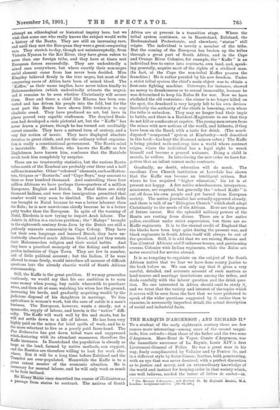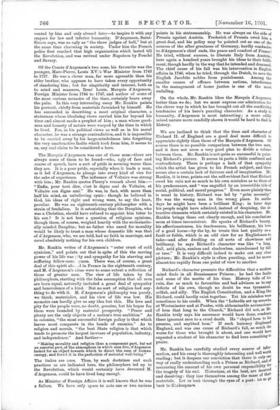THE MARQUIS D'ARGENSON ; AND RICHARD IL* To a student
of the early eighteenth century there are few names more interesting—among stars of the second magni- tude, bier entendu—than those of the father and the two sons. d'Argenson. Marc-Rene de Voyer, Comte d'Argenson, was the immediate successor of La Reynie, Louis XIV.'s first Lieutenant-General of Police. He was a great man in his way, finely complimented by Voltaire and by Fonten lle, and in a different style by Saint-Simon; fearless, bold, penetrating, with an eye that was never deceived, with a perfect discretion as to justice and mercy, and an extraordinary knowledge of the world and instinct for keeping order in that society which, one well believes, needed the terror of lettres de cachet—in,
• The Marquis d*Argenson ; and Richard II. By Reginald Rankin, M.A. London Longman and Co. [108. 6d. net.]
vented by him and only abused later—to inspire it with any respect for law and inferior humanity. D'Argenson, Saint- Simon says, was as ugly as "the three judges of hell," but at the same time charming in society. Under him the French police first reached that high organisation which lasted till the Revolution, and was revived under Napoleon by Fouche and Savary.
Of the Comte d'Argenson's two sons, his favourite was the younger, Marc-Pierre, Louis %V.'s War Minister from 1743 to 1757. He was a clever man, far more agreeable than his elder brother, who appears to have taken every opportunity of slandering him ; but for singularity and interest, both as to mind and manners, Rene Louis, Marquis d'Argenson, Foreign Minister from 1744 to 1747, and author of some of the most curious memoirs of the time, certainly bears away the palm. In this very interesting essay Mr. Rankin paints his portrait, chiefly from materials furnished by himself. He has succeeded in describing a most original character, a statesman whose idealising views carried him far beyond his time and almost made a prophet of him ; a man whose good- ness and honesty of nature were warped by the time in which be lived. For, in his political views as well as in his moral character, he was a strange contradiction, and it is impossible to be carried away by his large-mindedness into forgetting the very unattractive faults which took from him, it seems to us, any real claim to be considered a hero.
The Marquis d'Argenson was one of those men—there are always some of them to be found—who, ugly of face and coarse of speech, have a sort of pride in seeming worse than
they are. It is a poor pride, especially when it leads a man, as it led d'Argenson, to plunge into every kind of vice for the sake of experience. The influence of Voltaire was strong with him; Mr. Rankin quotes Fleury's remark about him :— " Enfin, pour tout dire, c'est le digne ami de Voltaire, et Voltaire son digne ami." He was, in fact, with more than half his mind, an unbelieving cynic : though he believed in God, his ideas of right and wrong were, to say the least, peculiar. He was an eighteenth-century philosopher with a strain of feudalism. Is it astonishing that the Dauphin, who was a Christian, should have refused to appoint him tutor to his son ? It is not here a question of religious opinions, though these, of course, weighed heavily with the ecclesiastic- ally minded Dauphin; but no father who cared for morality
would be likely to trust a man whose domestic life was that of d'Argenson, who, we are told, had no faith in marriage, and
cared absolutely nothing for his own children.
Mr. Rankin writes of d'Argenson's " outer crust of cold -cynicism," and points out that in spite of this the moving power of his life was city and sympathy for his starving and suffering fellow-conn ..ymen. There was, of course, a great deal of this spirit abi ,,,„d in France in the eighteenth century, and M. d'Argenson's ideas were to some extent a reflection of those of greater men. The view of life taken by the philosophers, starting with the false assumption that all men are born equal, naturally included a great deal of sympathy and benevolence of a kind. But no sort of religion had any- thing to do with it. M. d'Argenson's philosophy was purely, we think, materialist, and his view of life was low. His memoirs can hardly give us any idea but this. His love and
pity for the people were, no doubt, genuine, but his hopes for them were bounded by material prosperity. " Peace and plenty are the only objects of a nation's true ambition." As to colonies, "the most successful foreign policy is that which leaves most conquests in the hands of enemies." As to religion and morals, " the best State religion is that which tends to promote the largest increase of population, industry, and independence." And further— "Making morality and religion thus a component part, but not an essential part, of the atmosphere in which men live, d'Argenson looked for an object towards which to direct the sum of human energy, and found it in the perfection of material well-being."
The italics are ours. Thus, by such doctrines and such practices as are indicated here, the philosophers led up to the Revolution, which would certainly have devoured M. d'Argenson, could he have lived long enough.
As Minister of Foreign Affairs it is well known that he was a failure. We have only space to note one or two curious
points in his statesmanship. He was always on the side of Prussia against Austria. Frederick of Prussia owed him a great deal, and his policy may be pointed out as one of the sources of the after greatness of Germany, hardly conducive to d'Argenson's chief ends, the peace and comfort of France He tried, without success, to liberate Italy from Austria; here again a hundred years brought his ideas to their falai. ment, though hardly in the way that he intended and dreamed. The chief cause of his fall was his intervention in English affairs in 1746, when he tried, through the Dutch, to save the English Jacobite nobles from punishment. Among the smaller causes of offence between nations, interference in the management of home justice is one of the most unfailing.
On the whole, Mr. Rankin likes the Marquis d'Argenson better than we do; but we must express our admiration for the clever way in which he has brought out all the conflicting tendencies of his hero's puzzling character. As a study in humanity, d'Argenson is most interesting ; a more oddly mixed nature more candidly shown it would be hard to find in history.
We are inclined to think that the time and character of Richard IL of England are a good deal more difficult to appreciate rightly than those of the Marquis d'Argenson. Of course there is no possible comparison between the two men, and it does not seem a very good plan to divide a volume between them. Mr. Rankin is not quite so successful in paint- ing Richard's picture. It seems in parts a little confused and contradictory. There is perhaps a lack of that sympathy which the artist has given to his French subject, and there seems also a certain lack of fairness and of imagination. Mr. Rankin, it is true, points out the self-evident fact that Richard owed his ruin not so much to his own mistakes as to those of his predecessors, and " was engulfed by an irresistible tide of social, political, and moral progress." Even more plainly than is usual in history, Richard was led by "grim necessity." He was the wrong man in the wrong place. In earlier days he might have been a brilliant King; in later days his people might have admired, instead of despising, the at- tractive elements which certainly existed in his character. Mr. Rankin brings these out clearly enough, and his conclusions seem at times inconsistent. He speaks of Richard's beauty, his affectionateness, his fearlessness, his brilliancy, his love of a good horse—by the by, he treats this last quality as a fault or foible, which is an odd view for an Englishman to take—and after dwelling on all sorts of showiness and brilliancy, he says Richard's character was like " a long, dull, arid plain, sunless and shadowless, unredeemed by hill or tree." It is very difficult indeed to make out any clear picture; Mr. Rankin's style is often puzzling, and he moves almost too rapidly from one point of view to another.
Richard's character presents the difficulties that a modern mind finds in all Renaissance Princes ; he had the faults and some of the merits of his time. History tells of his ruin, due as much to favourites and bad advisers as to any defects of his own, though no doubt he was tyrannical, selfish, and silly. The English Constitution, and a King like Richard, could hardly exist together. Yet his mistakes were sometimes to his credit. When the " Lolardis set up scrowles at Westminster and at Potties, with abhominable accusations of hem that long to the Church," Richard did not, as Mr• Rankin truly says his successor would have done, condemn these ignorant men to a cruel death. He " cleped hem to his presens, and snybbed hem." If such leniency displeased England, and was one cause of Richard's fall, so much the worse for those who brought it about, and one would have expected a student of his character to find here something to praise.
Mr. Rankin has carefully studied every source of infor- mation, and his essay is thoroughly interesting and well worth reading ; but it deepens our conviction that there is only one way of really understanding such a Prince as Richard, and of measuring the amount of his own personal responsibility for the tragedy of his end. Historians, at the best, are deceived and deceiving : they lose themselves among the mass of their materials. Let us look through the eyes of a poet: let us go back to SLtakespeare.



























































 Previous page
Previous page